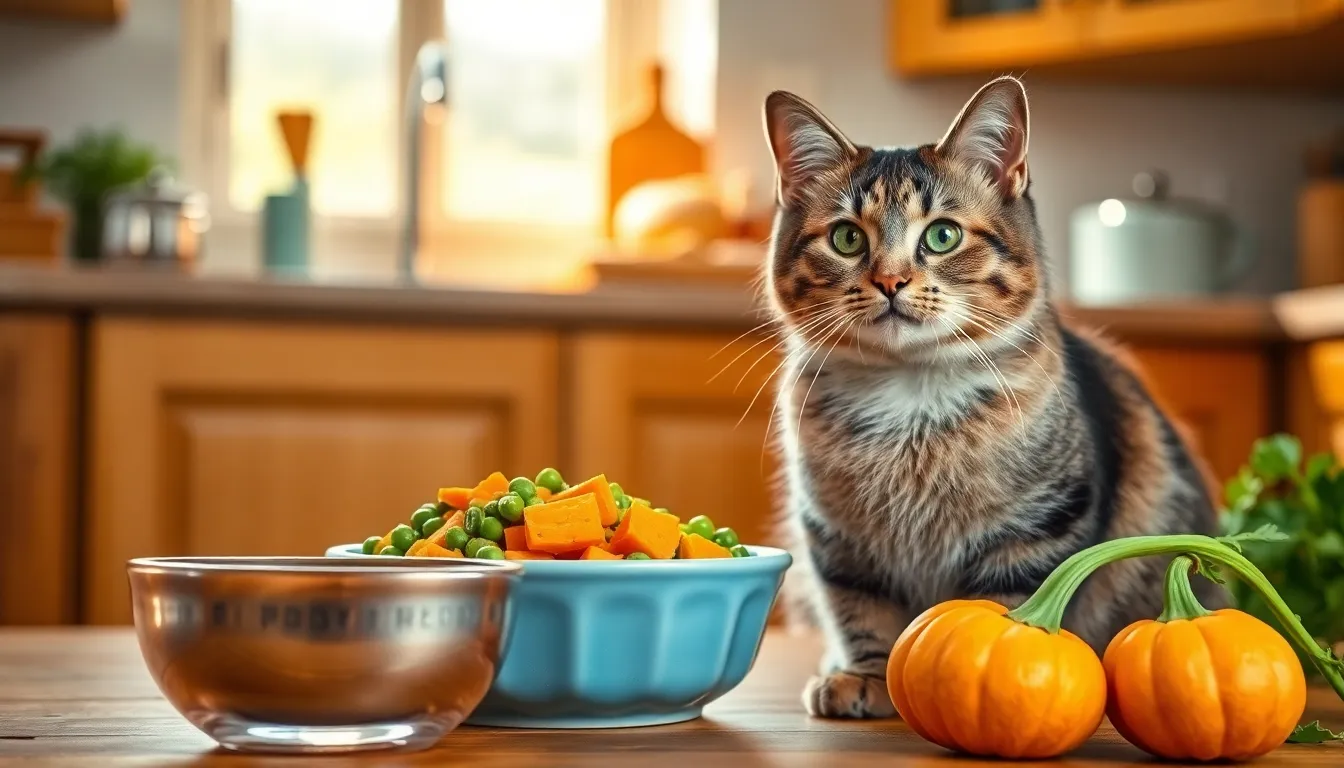When it comes to feline food choices, many cat owners might wonder if their whiskered companions can handle a little onion in their diet. After all, onions add flavor to our meals, but do they pack a punch for our furry friends? Spoiler alert: they don’t! In fact, onions can be downright dangerous for cats, and understanding why is crucial for every responsible pet parent.
Table of Contents
ToggleUnderstanding Onion Toxicity in Cats
Onions can pose serious health risks for cats. Understanding the specifics of onion toxicity helps prevent accidental ingestion and the potential harm it can cause.
What Makes Onions Toxic?
Onions contain thiosulfate, a compound harmful to cats. Thiosulfate can damage red blood cells, leading to hemolytic anemia. Cats lack the enzymes necessary to process thiosulfate effectively. Even small amounts of onion can result in toxic effects over time. Cooking or dehydrating onions does not eliminate this toxicity. Garlic, leeks, and chives, belonging to the same family, share similar toxic properties. Responsibly managing a cat’s diet ensures its safety and well-being.
Symptoms of Onion Poisoning in Cats
Symptoms of onion poisoning may include lethargy, vomiting, and diarrhea. Cats might also exhibit weakness or pale gums due to anemia. Dark-colored urine may indicate hemolysis occurring within the body. Increased heart rate and rapid breathing can signal severity of the condition. Observing these symptoms requires immediate veterinary attention. Treatment varies based on severity and involves supportive care and monitoring. Early intervention plays a crucial role in the cat’s recovery process.
Safe Foods for Cats

Providing safe foods for cats promotes their health and prevents dietary mishaps. Cats thrive on specific nutrients and foods that benefit them.
Cat-Friendly Vegetables
Carrots, peas, and pumpkin offer excellent options for felines. These vegetables provide essential vitamins while being safe for cats. Chopped or steamed versions make them easier to digest. Always introduce these foods gradually to monitor for any adverse reactions. Consult a veterinarian for personalized dietary advice.
Common Human Foods to Avoid
Garlic, chocolate, and grapes are among the top human foods dangerous for cats. Consumption can lead to severe health issues such as gastrointestinal upset and more serious conditions, including kidney failure. While some foods may seem harmless, it’s crucial to prevent access to them altogether. Always choose pet-safe alternatives to keep cats healthy and happy.
Veterinary Insights on Onion Consumption
Onions pose significant health risks to cats. Understanding these risks is vital for maintaining a cat’s well-being.
Expert Opinions
Veterinarians widely agree that onions are toxic to felines. Cats lack the enzyme necessary to metabolize thiosulfate, a compound found in onions. Nutrition experts have emphasized that even small amounts can have severe consequences, leading to hemolytic anemia. Consuming onions can cause symptoms such as vomiting, diarrhea, and lethargy. Veterinary advice stresses immediate action if a cat ingests onions. Prompt treatment can mitigate adverse effects and improve recovery outcomes. Experts also recommend educating pet owners about safe dietary choices.
Case Studies of Onion Poisoning
Several documented cases illustrate the dangers of onion consumption in cats. In one case, a tabby cat developed severe anemia after snacking on leftover onion from a dinner plate. Veterinary intervention revealed a drastic decrease in red blood cell count. Another instance involved a kitten that ingested a small piece of onion in a sandwich. Symptoms appeared within hours, necessitating emergency treatment. This kitten exhibited rapid breathing and weakness. Such case studies highlight the critical importance of preventing cats from consuming onions, underscoring the need for vigilance in pet ownership.
Links Between Onion Toxicity and Other Foods
Understanding the connection between onion toxicity and other foods helps cat owners make informed dietary choices. Certain foods share similar harmful properties with onions and also pose risks to feline health.
Foods Similar to Onions
Garlic ranks high among ingredients that threaten cats’ well-being. It contains compounds that, like those in onions, can damage red blood cells. Chives and leeks belong to the same family, sharing toxic characteristics. Shallots exhibit comparable toxicity levels, causing similar health issues. Even small amounts of these foods can lead to significant problems for cats. Symptoms may include lethargy vomiting and weakness, necessitating immediate veterinary care.
Other Toxic Vegetables for Cats
Onion and garlic aren’t the only dangerous vegetables for cats. Potatoes, particularly raw ones, contain solanine, which can lead to gastrointestinal upset. Rhubarb leaves pose another risk, containing oxalic acid that can cause kidney failure. Tomatoes also belong to this group, as their green parts can be toxic. Spinach, while healthy for humans, may lead to calcium oxalate crystals in susceptible cats. Preventing access to these harmful vegetables protects cats from serious health concerns.
Cats are vulnerable to the toxic effects of onions and related foods. Understanding the risks associated with these ingredients is essential for every cat owner. By avoiding onions and opting for safe alternatives, pet owners can protect their furry friends from serious health issues.
Early recognition of symptoms related to onion poisoning can make a significant difference in treatment outcomes. Regular consultations with a veterinarian can help ensure a cat’s diet remains balanced and safe. Prioritizing a cat’s health through informed dietary choices fosters a happier and healthier life for these beloved companions.

